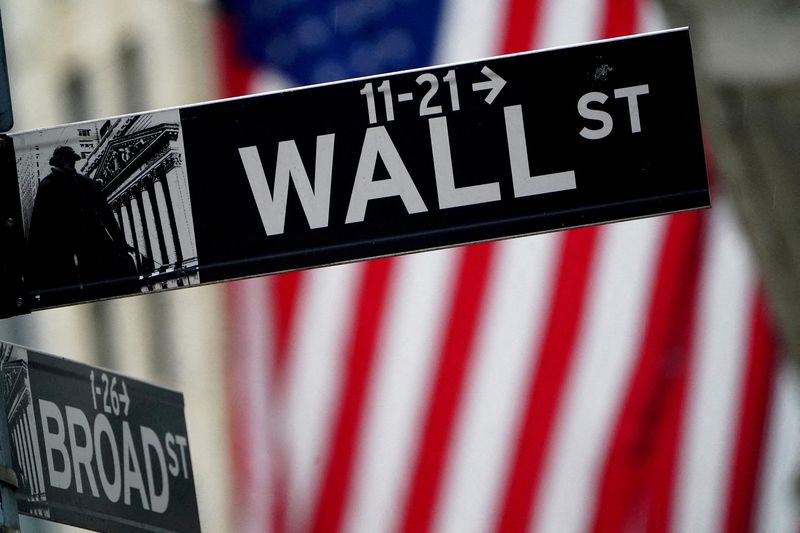By David Randall
NEW YORK (Reuters) - As investors await another jumbo-sized rate increase from the Federal Reserve, they are taking the temperature of a weeks-long U.S. stock market rally that followed a vicious first-half selloff.
Even after Tuesday's sharp fall, the S&P 500 remained up 7% from its June 16 low, buoyed in part by expectations that the Fed will pause its aggressive rate hikes early next year and a recent decline in commodity prices that investors hope will help ease inflation.
So far, the bounce has its share of doubters. Three rallies of comparable magnitude have already wilted this year, with stocks sliding to new lows each time. Blackrock (NYSE:BLK), the world’s largest asset manager, on Monday warned investors that more volatility lay ahead and said it was underweight developed market equities on expectations that inflation will stay tenacious.
"We think this is a bear market suckers' rally," said Steve Chiavarone, senior portfolio manager at Federated Hermes (NYSE:FHI), who believes the Fed will remain hawkish longer than expected and has reduced his equity exposure as the S&P pushed higher over the last few weeks.
Expectations that the Fed will end its market-bruising rate hikes sooner than forecast have helped power stocks higher. Nearly two-thirds of investors now believe the Fed funds rate will stand at 3.5% or lower by March 2023, up from just a third a month ago with that view, according to CME.
Investors expect the Fed to deliver another 75 basis points of tightening Wednesday, after already raising rates by 150 basis points so far this year. [FEDWATCH] Hopes for moderation after that could be dashed if consumer prices remain stubbornly high in coming weeks - repeating a scenario that dragged stocks lower this year, Blackrock’s strategists wrote.
"Inflation data could surprise to the upside – and cause markets to rapidly price a higher rate path once again. Result: another equities sell-off," BlackRock strategists wrote.
Data from the Wells Fargo (NYSE:WFC) Investment Institute showed the severity of the current bear market - which saw the S&P 500 fall as much as 23.6% below its January high - may depend on whether the economy is in a recession.
Bear markets accompanied by a recession have lasted an average of 18 months, during which stocks fell an average of 35.8%. Without a recession, bear markets lasted an average of 5.9 months with an average decline of 27.9%, the bank’s data showed.
On Sunday, U.S. Treasury Secretary Janet Yellen acknowledged the risk of a recession but said it was not inevitable. Still, parts of the market have continued to reflect investor unease, even as broader averages have bounced.
More stocks have posted new lows than new highs on the Nasdaq Composite Index for 76 straight days, the longest such stretch in 20 years, said Willie Delwiche, investment strategist at All Star Charts. The index is up nearly 9% from its June low.
"Until that relationship changes, it's premature to say that a bottom is in place," Delwiche said.
More optimistic investors point to an array of signals indicating bearish sentiment may have reached a crescendo in recent weeks, potentially exhausting sellers and making it easier for stocks to rebound.
A fund manager survey from BoFA Global Research last week showed expectations for global growth and profits at all-time lows and cash levels at their highest in two decades, two contrarian indicators the banks' strategists said could indicate greater stock gains ahead.
Short interest in the S&P 500, meanwhile, recently stood at its highest level since the depths of the coronavirus selloff in 2020, a signal that has occurred during past market bottoms, the bank's strategists wrote.
"We think it’s possible that the S&P 500 has already bottomed, and if it hasn’t, will find a bottom during the third quarter,” said Lori Calvasina, head of U.S. equity strategy at RBC Capital Markets, in a note to investors.
Calvasina recently added stock exposure, betting that a possible recession has already been baked into prices.

Christopher Murphy, co-head of derivatives strategy at Susquehanna International Group, believes this week’s earnings reports - which include results from heavyweights such as Apple Inc (NASDAQ:AAPL) and Meta Platforms– could play a key part in determining whether stocks can continue rallying.
For the time being, "the risks to the market are very well known right now" and already reflected in prices, he said.